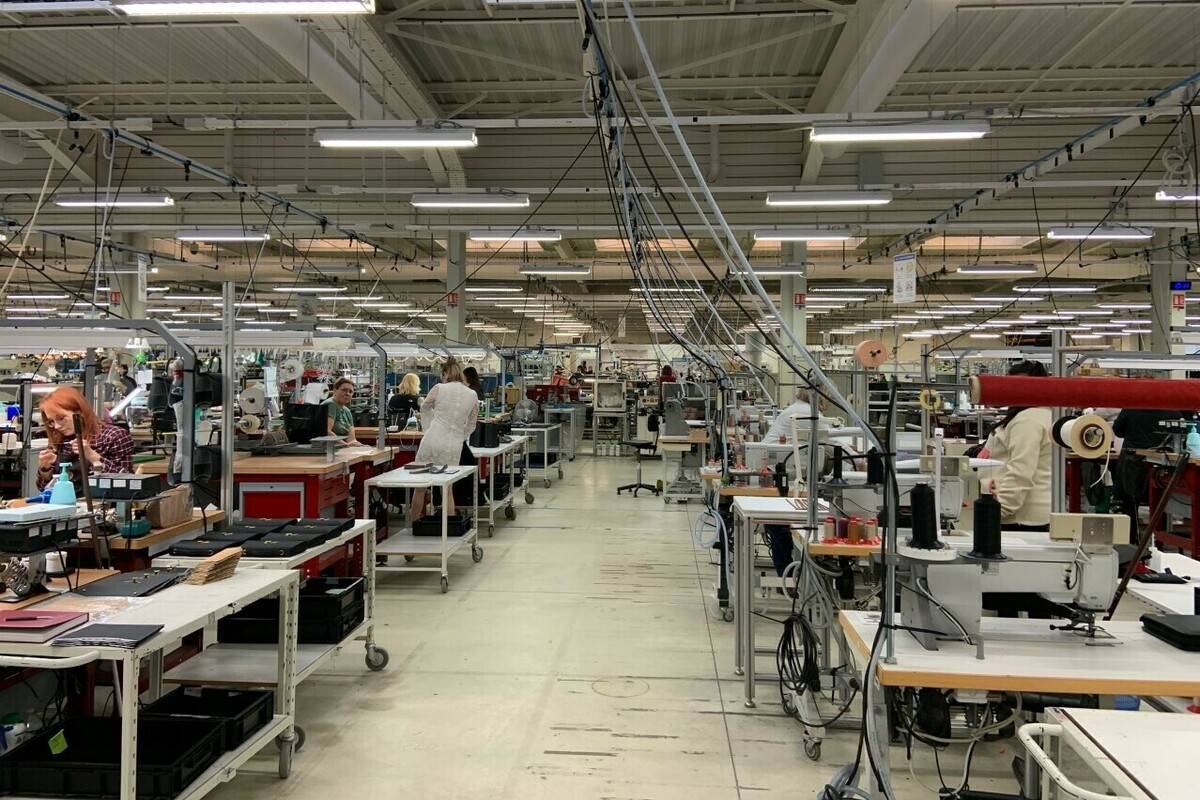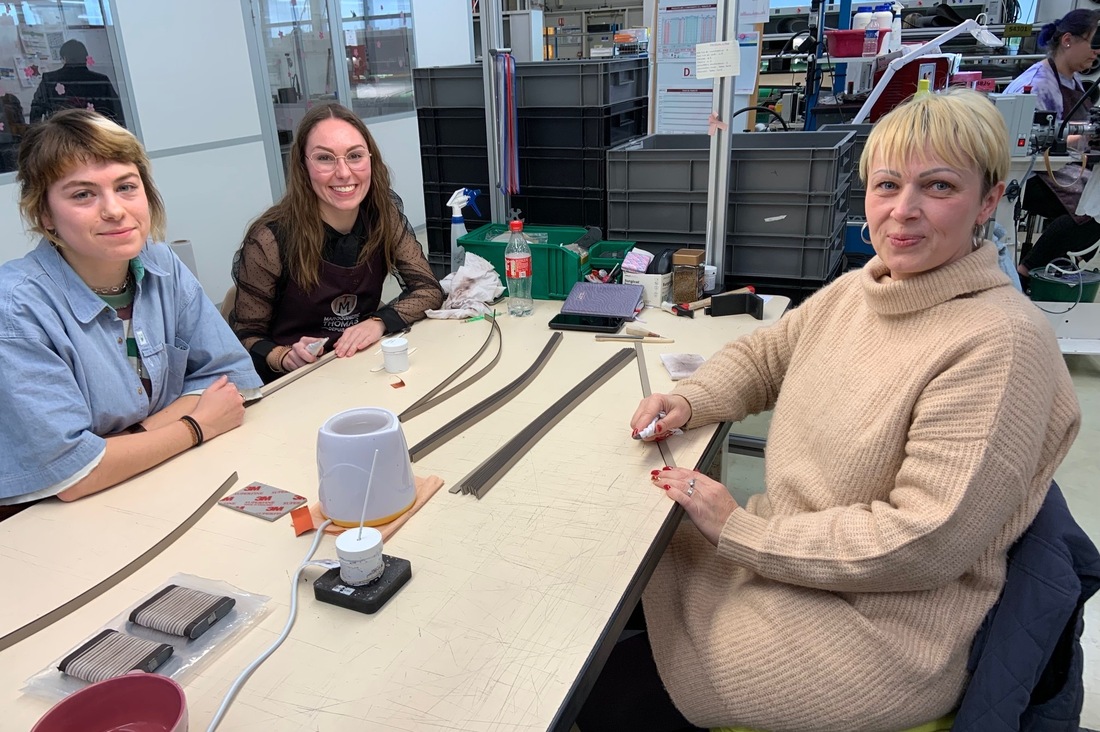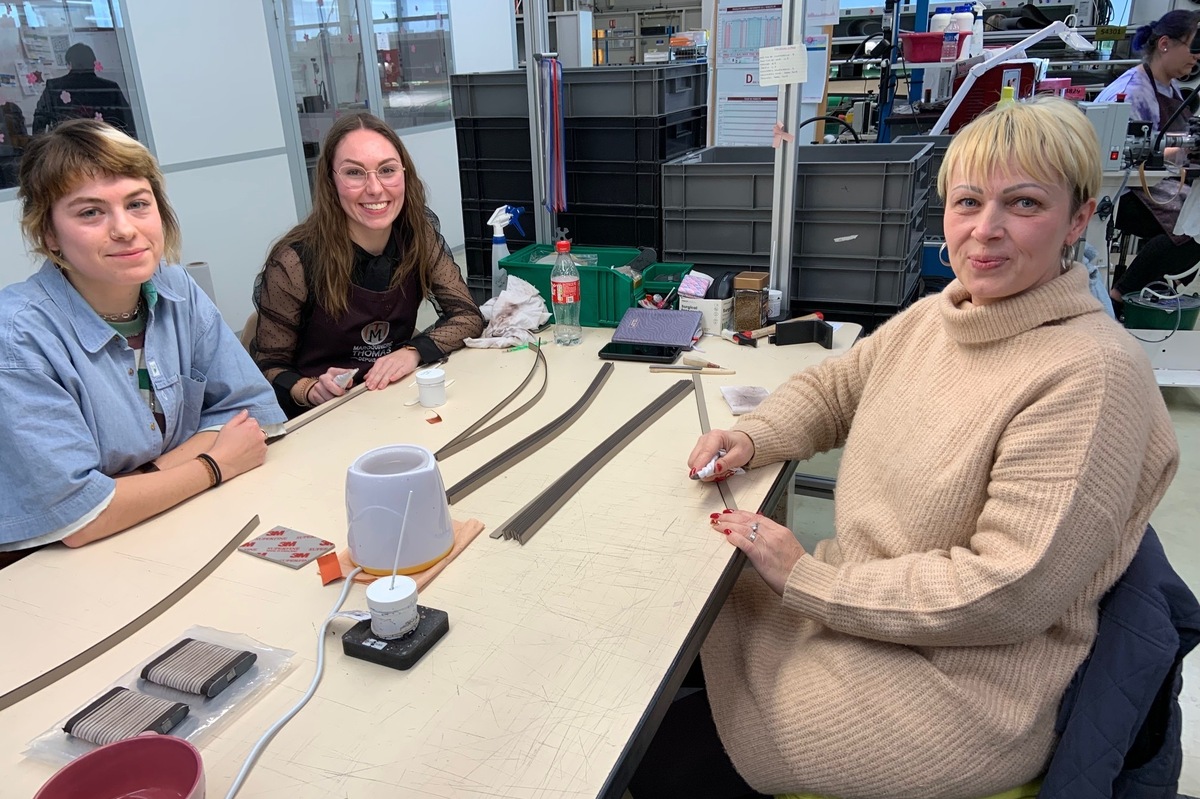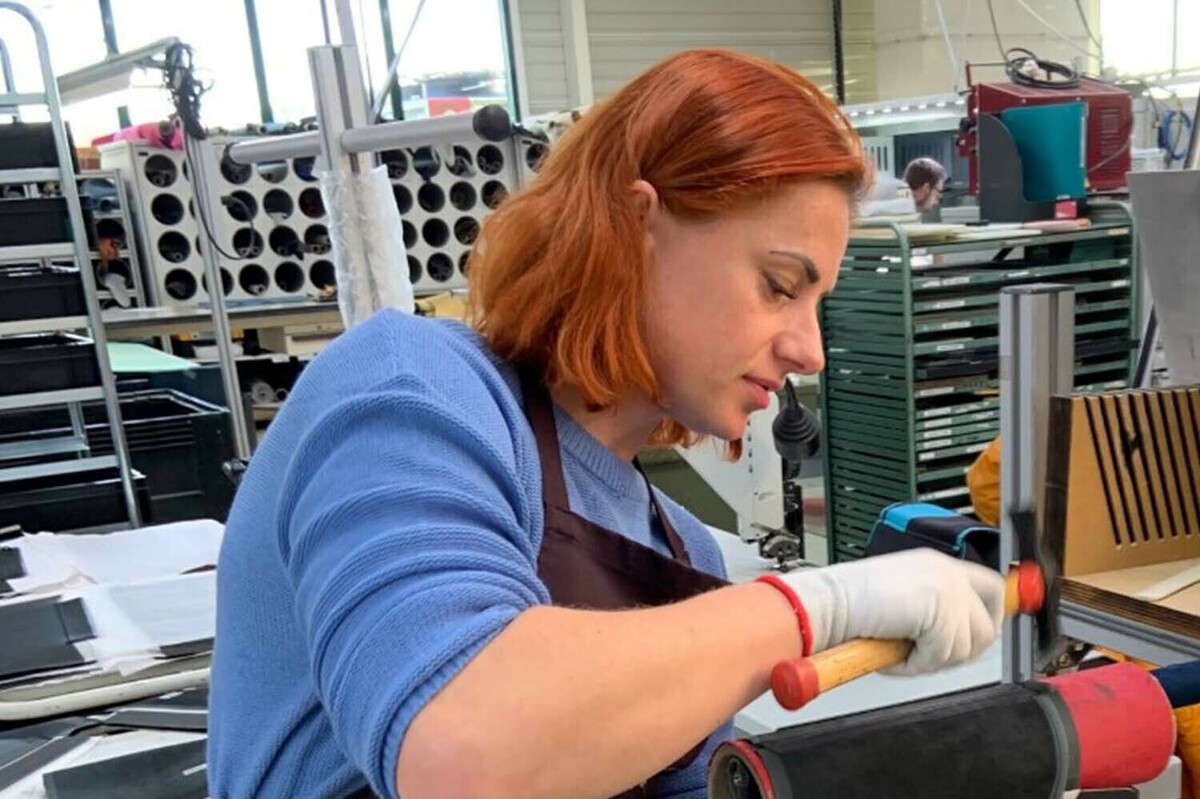
[ad_1]

The manufacturing unit produces leather-based purses for French luxurious manufacturers.
Eleanor Beardsley/NPR
conceal caption
toggle caption
Eleanor Beardsley/NPR

The manufacturing unit produces leather-based purses for French luxurious manufacturers.
Eleanor Beardsley/NPR
SEMUR-EN-AUXOIS, France — In a manufacturing unit on the sting of the medieval city of Semur-en-Auxois, French is not the one language being spoken as of late. Over the whir of stitching machines, the sounds of Russian and Ukrainian may be heard as properly.
The manufacturing unit has been turning out leather-based purses for French luxurious manufacturers for the reason that Seventies. Maroquinerie Thomas’ CEO Thierry Thomas says he is employed about 25 Ukrainians this yr.
“I hired the first five and then more started coming,” he says. “Cousins, sisters-in-law. They work hard, they adapt fast. At first I put them all together. That way if one understood, he could teach the others.”
Thomas says it isn’t charity. He cannot discover sufficient French staff.
He provides the Ukrainians long-term contracts with out having to undergo a trial interval, “so they can open bank accounts and rent apartments,” he says.
How does he talk with them?

Alexander Dubitsky arrived from Kharkiv on the finish of August.
Eleanor Beardsley/NPR
conceal caption
toggle caption
Eleanor Beardsley/NPR

Alexander Dubitsky arrived from Kharkiv on the finish of August.
Eleanor Beardsley/NPR
“Google Translate,” he says, laughing.
Europe is being remodeled by the warfare in Ukraine. Even locations removed from the battle are feeling the results. And the longer the warfare continues, the extra lasting these results will likely be.
France has taken in additional than 100,000 Ukrainian refugees, in keeping with the French authorities. They have the appropriate to remain and work and obtain a small month-to-month stipend. Ukrainian youngsters are studying in French colleges everywhere in the nation and plenty of French households are internet hosting Ukrainian households.
Thirty-three-year-old Alexander Dubitsky is engaged on a row of purse handles. He got here from Kharkiv on the finish of August. When requested if he’ll return, he says, “It’s not a question of rebuilding after the destruction in Ukraine. That doesn’t bother me at all. I would gladly help. But we are always in danger. Even if the war stops, Russia will collect its forces and attack us again three or four years later. This has been our reality for centuries.”
Oksana Zoubko is touching up bag straps with black paint. She was a baker in Kharkiv and says she loves working together with her arms once more.
“It’s a wonderful place to work,” she says. “A very wholesome atmosphere and our French colleagues are welcoming.”
Zoubko says she’d like to return to Ukraine, however thinks her nine-year outdated, who attends the village faculty, most likely has a brighter future in France.
Across the work desk, French colleagues Ines Chapovaloff and Maud Duvignacq say they really feel fortunate to share their savoir-faire and be taught from the Ukrainians. They reward the Ukrainians’ braveness and skill to point out up for work with a smile regardless of worries in regards to the warfare again dwelling.
Yevdokiia Bila, 36, who goes by Julia, tamps down some stitching with a small hammer. She was one of many first Ukrainians employed right here final March and is from Vovchansk, proper alongside the Russian border exterior Kharkiv.

The manufacturing unit is “a wonderful place to work,” says Oksana Zoubko (proper), sitting together with her colleagues Ines Chapovaloff (heart) and Maud Duvignacq (left). “A very wholesome atmosphere and our French colleagues are welcoming.”
Eleanor Beardsley/NPR
conceal caption
toggle caption
Eleanor Beardsley/NPR

The manufacturing unit is “a wonderful place to work,” says Oksana Zoubko (proper), sitting together with her colleagues Ines Chapovaloff (heart) and Maud Duvignacq (left). “A very wholesome atmosphere and our French colleagues are welcoming.”
Eleanor Beardsley/NPR
Thomas has such religion in Bila that he let her supervise a small crew of Ukrainians when their French coworkers all left for his or her August holidays.
“I was shocked, but in a good way,” she says. “All these French workers could go on vacation together. We don’t do that in Ukraine.”
She says different issues have shocked her in France, even the mail.
“Yes, letters and envelopes,” she says. “In Ukraine, everything is online. And here I get mail from the school, from the bank. I’ve gotten back into the habit of checking my mailbox again!”
Bila just lately needed to return to Ukraine to bury her mom, who had gone to the hospital when her city was underneath Russian occupation — however there have been no medical doctors. After the city was liberated, her mom was lastly recognized with a ruptured appendix, however it was too late. She died at age 61.

Yevdokiia Bila, one other Ukrainian worker, comes from a city exterior Kharkiv. Several of her members of the family and mates have additionally come to France.
Eleanor Beardsley/NPR
conceal caption
toggle caption
Eleanor Beardsley/NPR

Yevdokiia Bila, one other Ukrainian worker, comes from a city exterior Kharkiv. Several of her members of the family and mates have additionally come to France.
Eleanor Beardsley/NPR
Bila has rented a newly renovated condo within the heart of the cobblestone city, proper throughout from the church. The Christmas lights from the village sq. mild up her front room.
Several of Bila’s family and friends members are additionally in Semur-en-Auxois they usually usually collect for meals at her lengthy kitchen desk. On the hearth, she’s hung a Ukrainian flag she introduced together with her — it was a part of a celebration of Ukraine’s Maidan revolution again in 2014.
Her brother Timur Romanchuk and his spouse and daughter arrived in Semur-en-Auxois in June. The household had a farm and stayed so long as they might to guard it and the costly breed of goats whose milk they used to make cheese.
They stored hoping they would not lose their farm. Romanchuk says he thought he may keep underneath the Russian occupation. But when the Kremlin orchestrated referendums to annex Ukrainian territory this summer season, he knew it was not doable.
“Because I knew we’d all be forced to take Russian passports,” he says. That’s once they determined to desert the farm. They gave their goats to neighbors.
When requested if there are any circumstances underneath which they might stay usually in Vovchansk, they are not so certain.
“If there was a big garden in the place of Russia,” Bila says. “With sunflowers and wheat. We always imagine the problem is Putin, but Putin is not the reason, Putin is a consequence. There was also Stalin and there’s always something. Is there anybody with a conscience in Russia to wake up and change and be different?”
The Ukrainians take French classes each week on the manufacturing unit. Thirty-nine-year-old Andriy Pryputniev, a former coal miner, follows alongside intently. His household acquired out of Kharkiv in March, and he adopted them to France in September.
“My children study in a French school,” he says. “My son plays football and another son plays guitar and music in the school.”
This yr wasn’t the primary time Pryputniev has needed to flee to a brand new place. In 2014, he arrived in Kharkiv from his dwelling in Luhansk, after preventing there between Russian separatists and Ukrainian forces.
He had all the time thought he would spend the remainder of his days in Luhansk. “I thought I’d collect my pension there,” he says.
Nowadays, “Sometimes when I drive the car back home after work, I think in my head, ‘Where am I?'” he says with fun. “I’m in France? Seriously?”
Pryputniev takes his French classes significantly. With two destroyed homes behind him, he says he isn’t going again to Ukraine.
[adinserter block=”4″]
[ad_2]
Source link